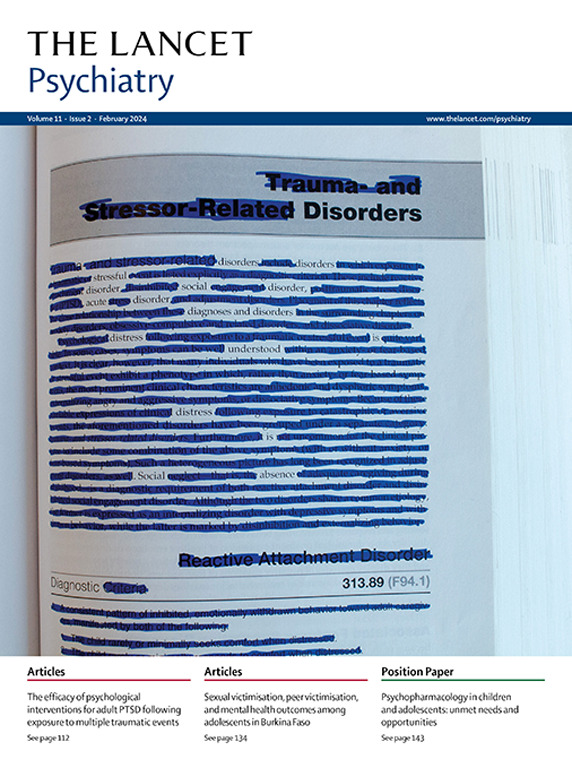Efficacy of clozapine versus second-generation antipsychotics in people with treatment-resistant schizophrenia: a systematic review and individual patient data meta-analysis
IF 30.8
1区 医学
Q1 PSYCHIATRY
引用次数: 0
Abstract
Background
Clozapine is recommended by national and international guidelines for people with treatment-resistant schizophrenia. However, available meta-analyses of randomised controlled trials have not shown superior efficacy of clozapine when compared with other second-generation antipsychotics, with heterogeneity identified between the original studies. We aimed to use individual patient data (IPD) to account for potential reasons of variability and to synthesise an adjusted estimate for the difference in efficacy between clozapine and other second-generation antipsychotics for treatment-resistant schizophrenia.Methods
In this systematic review and IPD meta-analysis, we searched the Cochrane Schizophrenia Group's Study-Based Register from inception to Jan 24, 2024, and previous reviews for blinded randomised controlled trials comparing clozapine with other second-generation antipsychotics in participants with treatment-resistant schizophrenia. Trials were eligible if they included patients with treatment-resistant schizophrenia and had a duration of at least 6 weeks. IPD were requested from trial investigators. The primary outcome was change in overall schizophrenia symptoms as measured by the Positive and Negative Syndrome Scale (PANSS) between clozapine and other second-generation antipsychotics after 6–8 weeks of treatment. The effect size measure for the primary outcome was mean difference with 95% credible interval (CrI). We fitted a Bayesian random-effects IPD meta-regression model that included duration of illness, baseline severity, and sex as potential prognostic factors or treatment effect modifiers. Confidence in the evidence was assessed using Grading of Recommendations, Assessment, Development, and Evaluation (GRADE). People with lived experience of mental illness were involved in this study. This study is registered with PROSPERO, CRD42021254986.Findings
We screened 13 876 references and included 19 studies with data for 1599 participants; IPD were available for 12 of 19 trials (n=1052; mean age 37·67 years [SD 11·24; range 10–66]; 348 [33·08%] women and 704 [66·92%] men). Data on ethnicity were not available. The estimated mean difference in change from baseline PANSS total score was –0·64 points (95% CrI –3·97 to 2·63; τ=2·68) in favour of other second-generation antipsychotics. Shorter duration of illness and higher baseline severity were prognostic factors associated with a larger reduction in symptoms, but neither those factors nor sex were found to modify the relative effect between clozapine and other second-generation antipsychotics. The confidence in the evidence was graded as very low.Interpretation
This IPD meta-analysis found a small and uncertain advantage of other second-generation antipsychotics, mainly olanzapine and risperidone, and so did not provide evidence for superior efficacy of clozapine compared with other second-generation antipsychotics in treatment-resistant schizophrenia. It is limited by unavailability of IPD for some studies, uncaptured sources of variance, and uncertainty due to premature study discontinuation. Given the side-effects of clozapine, the observed uncertainty regarding clozapine's superiority warrants prudent use and further research.Funding
German Ministry of Education and Research.氯氮平与第二代抗精神病药物对难治性精神分裂症患者的疗效:一项系统评价和个体患者数据荟萃分析
背景:国家和国际指南推荐氯氮平用于难治性精神分裂症患者。然而,现有的随机对照试验荟萃分析并没有显示氯氮平比其他第二代抗精神病药物更有效,并且在原始研究中发现了异质性。我们的目的是使用个体患者数据(IPD)来解释变异性的潜在原因,并综合氯氮平和其他第二代抗精神病药物治疗难治性精神分裂症的疗效差异的调整估计。方法在本系统综述和IPD荟萃分析中,我们检索了Cochrane精神分裂症组从成立到2024年1月24日的基于研究的登记册,以及之前对氯氮平与其他第二代抗精神病药物在治疗抵抗性精神分裂症患者中的比较的盲法随机对照试验的综述。如果试验包括难治性精神分裂症患者,且持续时间至少为6周,则试验符合条件。IPD是由试验调查员要求的。主要结局是氯氮平与其他第二代抗精神病药物治疗6-8周后,用阳性和阴性综合征量表(PANSS)测量的精神分裂症总体症状的改变。主要结局的效应量测量为95%可信区间(CrI)的平均差异。我们拟合了一个贝叶斯随机效应IPD元回归模型,其中包括病程、基线严重程度和性别作为潜在的预后因素或治疗效果修饰因子。采用推荐、评估、发展和评价分级法(GRADE)评估证据的可信度。有过精神疾病经历的人参与了这项研究。本研究注册号为PROSPERO, CRD42021254986。研究结果:我们筛选了13876篇参考文献,包括19项研究,1599名参与者的数据;19项试验中有12项可获得IPD (n=1052;平均年龄37.67岁[SD 11.24;10 - 66);女性348人(33.08%),男性704人(66.92%))。没有关于种族的数据。与基线PANSS总分相比,估计平均变化差为- 0.64分(95% CrI为- 3.97 ~ 2.63;τ=2·68),支持其他第二代抗精神病药物。较短的病程和较高的基线严重程度是与症状减轻程度较大相关的预后因素,但没有发现这些因素和性别改变氯氮平与其他第二代抗精神病药物之间的相对效果。证据的可信度被评为非常低。本IPD荟萃分析发现其他第二代抗精神病药物(主要是奥氮平和利培酮)的优势很小且不确定,因此没有证据表明氯氮平在治疗难治性精神分裂症方面优于其他第二代抗精神病药物。由于某些研究无法获得IPD,未捕获的方差来源以及由于过早终止研究而产生的不确定性,它受到限制。鉴于氯氮平的副作用,观察到的氯氮平优越性的不确定性值得谨慎使用和进一步研究。资助德国教育和研究部。
本文章由计算机程序翻译,如有差异,请以英文原文为准。
求助全文
约1分钟内获得全文
求助全文
来源期刊

Lancet Psychiatry
PSYCHIATRY-
CiteScore
58.30
自引率
0.90%
发文量
0
期刊介绍:
The Lancet Psychiatry is a globally renowned and trusted resource for groundbreaking research in the field of psychiatry. We specialize in publishing original studies that contribute to transforming and shedding light on important aspects of psychiatric practice. Our comprehensive coverage extends to diverse topics including psychopharmacology, psychotherapy, and psychosocial approaches that address psychiatric disorders throughout the lifespan. We aim to channel innovative treatments and examine the biological research that forms the foundation of such advancements. Our journal also explores novel service delivery methods and promotes fresh perspectives on mental illness, emphasizing the significant contributions of social psychiatry.
 求助内容:
求助内容: 应助结果提醒方式:
应助结果提醒方式:


